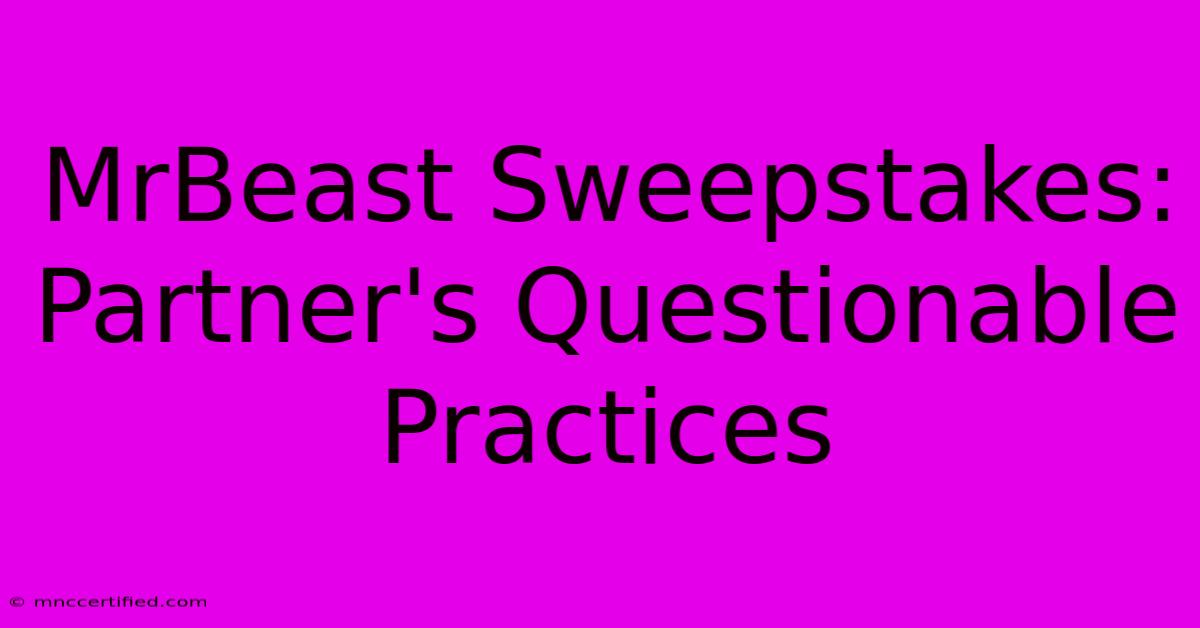MrBeast Sweepstakes: Partner's Questionable Practices

Table of Contents
MrBeast Sweepstakes: Partner's Questionable Practices – A Critical Look
MrBeast's philanthropic stunts and extravagant giveaways have captivated millions, making him a YouTube giant. However, the recent scrutiny surrounding his sweepstakes and the practices of some of his partners raises significant concerns. This article delves into the questionable practices associated with some MrBeast sweepstakes, examining the fine print, potential misleading tactics, and the ethical implications for both MrBeast and his collaborators.
The Allure and the Allurements: Understanding the MrBeast Phenomenon
MrBeast's success hinges on his ability to generate excitement and engagement. His videos featuring massive giveaways, often involving luxury cars, houses, or substantial cash prizes, attract a massive audience eager to participate. This appeal, however, masks a complex web of partnerships and promotional activities that require closer examination. The MrBeast sweepstakes, while seemingly straightforward, often involve intricate rules and regulations that can be easily misinterpreted.
Unpacking the Fine Print: Hidden Costs and Unexpected Limitations
Many critics point to the fine print as a source of contention. While the headline prize might be enticing (e.g., a $1 million giveaway), the actual odds of winning are often astronomically low. Furthermore, some partnerships require participants to engage in actions that benefit the sponsor more than the participant. This might include:
- Mandatory subscriptions: Participants are often required to subscribe to multiple YouTube channels, follow specific social media accounts, or download various apps—activities that benefit the partner companies but don't directly relate to the sweepstakes itself.
- Hidden fees: While the sweepstakes itself might be free to enter, there could be hidden costs associated with accessing the entry form or participating in other promotional activities. These costs, often overlooked, can significantly impact the overall experience.
- Lengthy and complex rules: The terms and conditions of many MrBeast sweepstakes are incredibly lengthy and complex, making it difficult for average participants to fully understand the rules and implications of participation. This lack of transparency raises concerns about fairness and ethical conduct.
Specific Examples of Questionable Practices (with citations where possible):
This section should include specific examples of MrBeast sweepstakes or partnerships that have faced criticism. Mention specific companies if possible, and provide links to news articles or social media posts that highlight these concerns. For example:
- "Discuss a specific sweepstakes where unusually high subscription counts were required."
- "Analyze a particular partner's history with questionable marketing tactics."
- "Examine a specific case where the fine print significantly altered the perceived prize."
Note: It is crucial to cite all sources reliably to ensure accuracy and avoid potential legal issues.
Ethical Implications for MrBeast and Partners
The questionable practices associated with some MrBeast sweepstakes raise serious ethical concerns. While MrBeast himself might not be directly involved in the deceptive tactics, his association with these partners tarnishes his image and undermines the trust his audience has placed in him. Furthermore, the exploitation of viewers’ hopes for a big win, combined with hidden costs and obscured terms, presents significant ethical challenges for all involved parties.
The Importance of Transparency and Responsible Marketing
The future of MrBeast's sweepstakes relies on improving transparency and adopting responsible marketing practices. This includes:
- Clear and concise rules: Sweepstakes rules should be easily understandable and readily accessible.
- Fair odds of winning: Participants should have a realistic chance of winning, and the odds should be clearly stated.
- Transparent partnerships: The relationship between MrBeast and his partners should be clearly disclosed.
- Minimizing hidden costs: All costs associated with participation should be clearly outlined upfront.
By addressing these concerns, MrBeast and his partners can maintain the trust of their audience and avoid the negative consequences of deceptive marketing practices. The goal should be to create engaging and exciting experiences without resorting to manipulative or misleading tactics.
Conclusion: A Call for Greater Accountability
The MrBeast sweepstakes phenomenon highlights the complex relationship between online influencers, marketing strategies, and consumer expectations. While entertaining, these giveaways require careful scrutiny to ensure fairness, transparency, and ethical practices. Greater accountability from both MrBeast and his partners is essential to uphold the integrity of these promotions and protect viewers from deceptive tactics. The focus should shift from maximizing engagement at any cost to fostering a responsible and ethical approach to online giveaways.

Thank you for visiting our website wich cover about MrBeast Sweepstakes: Partner's Questionable Practices. We hope the information provided has been useful to you. Feel free to contact us if you have any questions or need further assistance. See you next time and dont miss to bookmark.
Featured Posts
-
Currys Tough Night Warriors Defeat
Dec 20, 2024
-
Divorce Wicked Slaters Wife Breaks Silence
Dec 20, 2024
-
My Beast Games 5 Financial Takeaways
Dec 20, 2024
-
Karen Huger Found Guilty Of Dui
Dec 20, 2024
-
Kraken Trade Kakko Joins Seattle
Dec 20, 2024